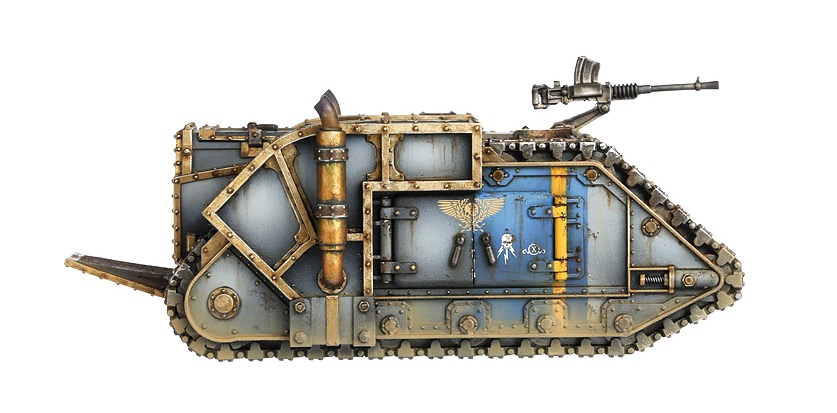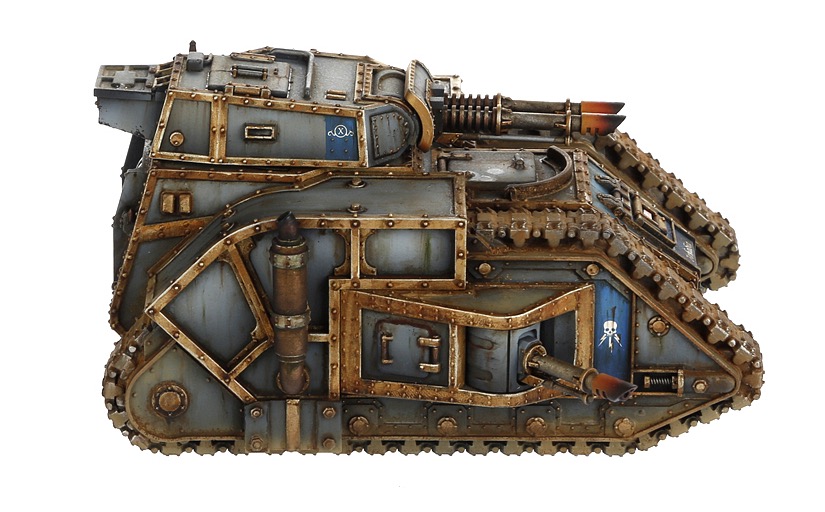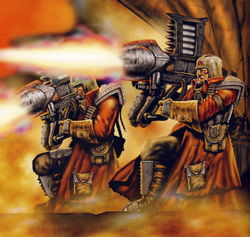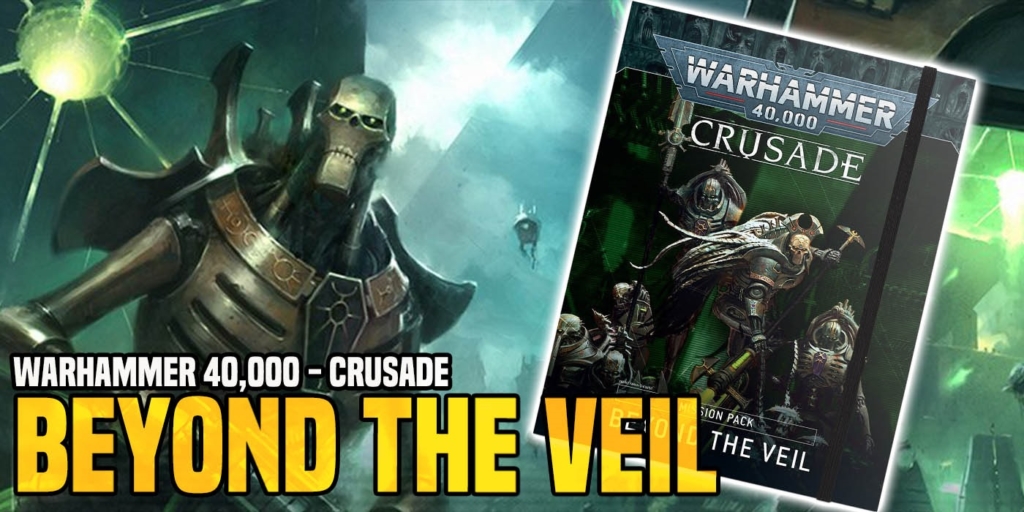Warhammer 40K: The Imperial Army – Precursor To The Guard

Once upon a time the Armored fist of the Emperor was even more feared than the Astra Militarum of today.
The Imperial Army (also known as the Imperialis Auxilia in High Gothic) was the largest military force in the early Imperium, and was founded during the early Great Crusade to fill the need for more manpower to support the Astartes Legions, and quickly was used to garrison worlds, perform sieges, and mass invasions. The Imperialis Armada was the fleet subset of the Imperial Army and was subordinate to it, and both of them were subordinate to the Astartes command structure.
The fighting elite of the Imperial Army was the Solar Auxilia, which comprised about 20-25% of the Army’s strength by the end of the Great Crusade. The Imperial Army also maintained a force of auxiliaries known as the Imperialis Militia.
Early History
The genus of the armed force that was to become the Imperial Army was on Terra, in the form of the few Strife-era military formations that the Emperor allowed to continue in his service after the end of the Unification Wars. These surviving units in time became referred to as the Old Hundred, and formed the initial nucleus of human soldiery at the very beginning of the Great Crusade.
When the Emperor left Terra on the Great Crusade, it is said that he would expect the inhabitants of the worlds he conquered to maintain defences and armed forces for their own safety, against internal rebellion and external invasion; similar to the role of Planetary Defence Forces in the 41st millennium. It is out of these forces that the Imperial Army was first formed. Initially used as garrison forces, they were quickly pushed to the forefront of the Crusade.
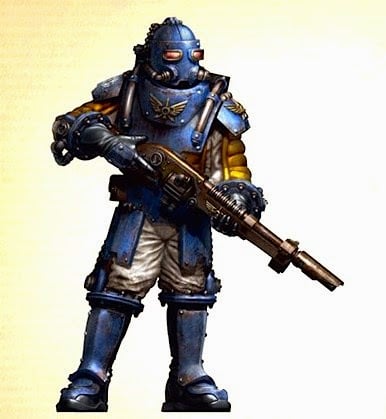 Imperial Army trooper of the Solar Auxilia
Imperial Army trooper of the Solar Auxilia
The Imperial Army’s subordination to the Astartes Legions led to the Imperial Army tearing itself apart in the Horus Heresy, when half of the legions rebelled against the Emperor, and took their Army regiments with them. Thousands of Army commanders took it upon themselves to carve themselves their own empires, with no loyalty to Horus or the Emperor, and it was centuries before the Imperium was reforged.
In the aftermath of the Horus Heresy many changes were made to the structure of the Imperial armed forces. Many of these changes were made to ensure to no single individual would be powerful enough ever again to attempt to overthrow the ruling body of Imperium if he turned traitor. It was during these post-Heresy reforms that the Imperial Army was split into two organisations: the Astra Militarum and the Imperial Navy; the link between them was severed. Astra Militarum commanders now have no authority over the Navy personnel transporting them and are forbidden from being able to command a navy force.
Organisation and Recruitment of the Imperial Army
Recruitment
The Imperial Army was recruited from each world in the Imperium unless exempted (such as Astartes home worlds, Forge Worlds, and planets in the Sol System, though some of the regiments from the Unification Wars of Terra were allowed to fight in the Great Crusade), but the size of the tithed forces was dependent on the population of the planet, and Imperial administrators determined the amount of soldiers and war materiel demanded. If all else failed or in times of desperation, the Imperial Army would utilize inducted levy militia, troops with little to no training and poor equipment.
The best equipped and trained Imperial Army troops were known as Grenadiers.
Organisation
The largest single organisational unit in the Imperial Army was the Expedition Fleet, each of which was controlled by a Lord Commander unless an Astartes officer was attached. By the time of the Ullanor campaign and the inauguration of Warmaster Horus, there were 4,659 Primary Expedition Fleets (with 372 of those in refit at the time) and more than sixty thousand Secondary Expedition Fleets. Expedition Fleets each had several ships and a large amount of Army personnel for ground warfare.
For garrisoning and occupying worlds, the Imperial Army organized local Imperialis Militia units.
Organisation of Imperial Army Regiments
The largest permanent organisational unit during the Horus Heresy for the Imperial Army was the regiment, and to take a typical example, regiments could be divided into three or more battalions, with each battalion made up of two or more companies and Platoons, with additional support units attached at the battalion and regimental level.
The organisation of individual regiments varied immensely because of the massive lack of standardization within the Imperial Army. Expedition Fleets were only equipped with a portion of their supply needs, and were expected to re-supply themselves from conquered worlds. These issues were partially resolved with the Council of Terra‘s introduction of the Departmento Munitorum. The Munitorum originally existed as the Corps Logisticae, a division of naval administration, but was made into a full Departmento shortly before the Ullanor Crusade.
Organization of the Imperialis Armada
Regiments were usually assigned to individual ships, with Army personnel commanding both elements.
In the fleet, the highest rank was the Master of the Fleet, who was under the authority of the Lord Commander or Astartes officer in the Expedition Fleet. Other common ranks include Shipmaster (in control of a ship), Executive Officer (second in command), First Master and Master (other ship officers).
Some fleets, like the Saturnine Fleet, retained their old ranks from before the Unification Wars.
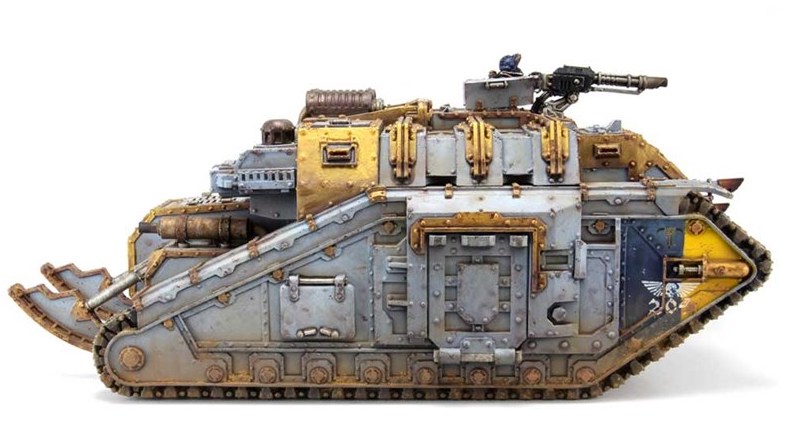 Dracosian of the Solar Auxilia
Dracosian of the Solar Auxilia
Equipment
The Imperial Army of the Great Crusade was much more well-equipped than the Astra Militarum of the 41st Millennia. Vehicles that are considered rare or lost technology in M41 were common, such as the Testudo, Dracosan, Gorgon, Malcador, Leman Russ Incinerator, Leman Russ Vanquisher, Leman Russ Executioner, and Destroyer Tank Hunter. Entire divisions were equipped with Baneblade and Stormhammer Super-Heavy Tanks and Valdor Heavy Tanks and fleets were equipped with multitudes of Battleships and Grand Cruisers, all now considered a rarity. In the ten thousand years since the Great Crusade and Horus Heresy, STCs have been lost, Forge Worlds destroyed, and the technology has been treated with far more superstition by the Adeptus Mechanicus.
Notable regiments
- Ayliet Phalanx – Subordinate to the Luna Wolves
- Byzant Janizars – attached to the 63rd Expedition Fleet, rebelled during the Horus Heresy
- Clandestine Orta – Special forces akin to Stormtroopers
- Fellesian 23rd Airborne
- Geno Five-Two Chiliad – attached to the 670th Expedition Fleet; part of the Old Hundred
- Jovian Grenadiers
- Lucifer Black – attached to the 670th Expedition Fleet
- Malcador’s Chosen – Praetorian Guard of Malcador the Sigilite
- Prospero Spireguard – attached to the 28th Expedition
- Saturnine Hoplites
- Solar Auxilia – Elite fighting force
Learn More of the Imperial Army
Lexicanum
Solar Auxilia vs Scions – Place Your Bets?

